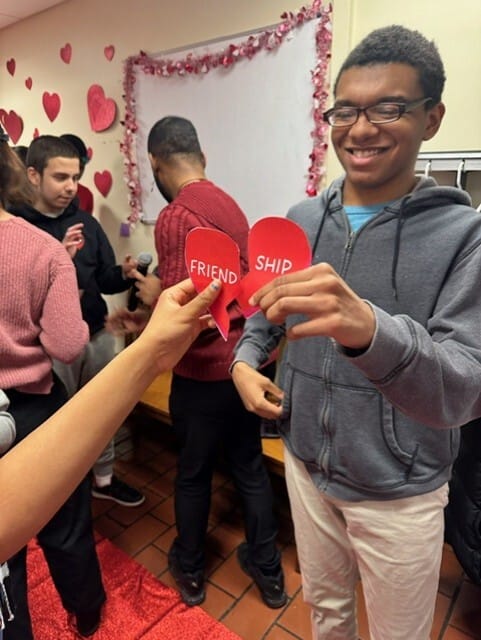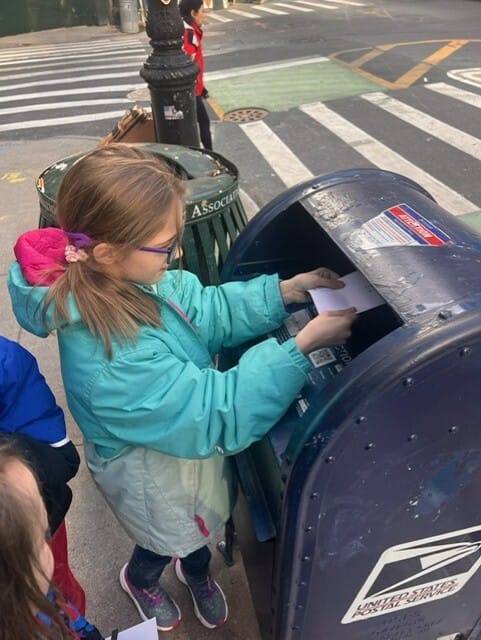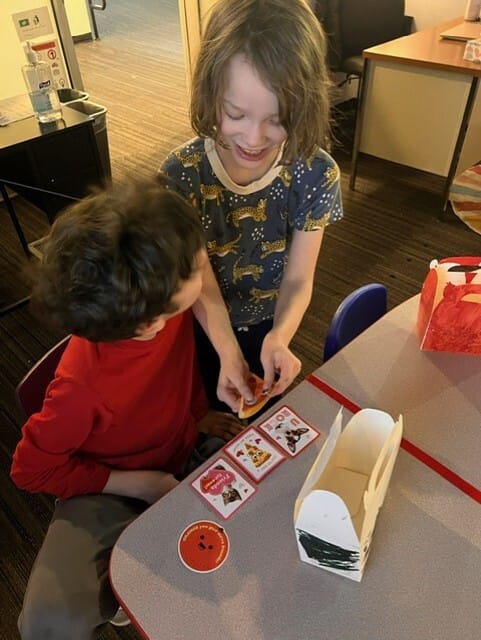- The CA Voice
- Posts
- February 2025: Friendship's in the air!
February 2025: Friendship's in the air!

A newsletter brought to you by the Speech Department at Children’s Academy
In this newsletter:
February 2025
Friendship’s in the air!
 Finding their other half | February is famous for love, but we think friendship is highly underrated! Our upper school and lower school students celebrated friendship in its many forms throughout the month. From learning about mail and writing letters to friends to planning a Valentine’s Day fashion show, our students had a February to remember. |
 A tribute to hugs |  Can’t get enough |

Signed, sealed, delivered
 Laying our cards on the table |  V Day pals |
SLP Spotlight: Shami Valleser
 Shami Valleser (left) CF-SLP | Shami Valleser joined CA in January 2024 as a lower school speech-language therapy intern before transitioning into an official role in the summer of 2024. She currently works with 8th–12th grade students but has experience supporting individuals of all ages, from young children to older adults, addressing a wide range of communication challenges. Additionally, she was social worker in the Philippines, where she supported children in the foster care system. Shami's professional interests and expertise include working with children on the autism spectrum, as well as those with receptive and expressive language difficulties, social pragmatic challenges, and reading comprehension needs. She is particularly passionate about child-centered and play-based therapy, and she loves integrating students' interests and hobbies to create engaging and effective learning experiences. |
Committed to a holistic approach, she collaborates closely with families and other professionals to ensure comprehensive support for her students. Outside of CA, Shami enjoys staying active through tennis, volleyball, and ping-pong. She also has a strong interest in weightlifting, linguistics, cooking, baking, video games, and watching TV and Broadway shows.
Topics in Speech-Language Pathology: Social Skills and Friendship
Developing social connections is a top priority at Children’s Academy. We have seen the power of peer relationships and how they can impact students’ mental health and academic success. We also know the challenges that many of our students face in forming and maintaining friendships. The SLPs at CA work to strengthen social communication skills in a way that is meaningful while simultaneously honoring students’ unique strengths and identities. |  |
The field of speech-language pathology continues to evolve, and the way SLPs teach social skills has undergone a significant transformation in the past several years. The social skills training of the past often prioritized neurotypical social norms, which often led to neurodivergent children masking their natural ways of interacting. This, of course, is never our end goal!
The field of speech-language pathology continues to evolve, and the way SLPs teach social skills has undergone a significant transformation in the past several years.
The neurodiversity movement has highlighted the importance of using a strengths-based approach and respecting autistic communication styles rather than forcing compliance and conformity. Therapy now focuses on self-advocacy, understanding individual social preferences, and teaching peers to bridge communication differences.
With all that being said, it’s important for us to find the balance between celebrating our students’ differences while also supporting their ability to succeed outside of the classroom.
What does this look like in practice? Well, the answer is different for each child and/or peer group. We follow students’ leads, keeping in mind both their developmental stages and their preferred style of play and/or communication. We model language to self-advocate, share interests, and become an active participant in the group activity. We model flexibility and provide a number of opportunities for peer connections throughout their day.
Neurodivergent adults have shared their experiences with social skills training, and in their perspective, the most successful programs:
Were fun, interactive, and practical
Included neurodivergent peer mentors
Allowed participants to choose their own supports rather than being told what they needed
Emphasized self-advocacy and understanding of autistic identity
Encouraged neurotypical individuals to adjust their communication styles as well
Overheard at CA
 | (Student delivers a Valentine card with a football on it). Lachlan: Aw! That’s very kind! I love football. That’s so nice! Lachlan is a 12-year-old verbal communicator who loves football and small gestures. |
Do it at home: Plan a playdate!
Playdates can be a great way for children to build social connections and practice skills such as turn-taking and conflict resolution. However, it’s important to remember success looks different for every child, and it may take time to fully understand their specific preferences when it comes to peer interaction. Parents can help by planning low pressure activities, focusing on quality over quantity, and celebrating small wins like children sharing a space together or having a few minutes of engagement. |  |
Set up structured yet flexible activities based on your child’s interests, and allow breaks as needed. Guide interactions gently by providing opportunities and options without forcing them — follow your child’s lead!
It might also be helpful to model language to support your child’s self-awareness and self-advocacy skills. Most importantly, recognize that friendships grow over time. Even brief, positive moments can lay the foundation for social success in the future!
Happy playing!